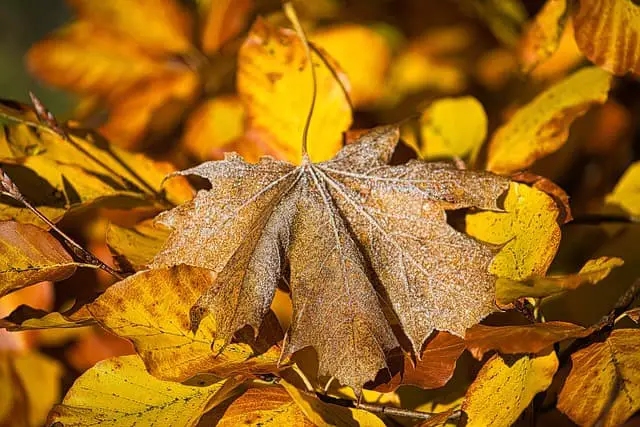Most things about your rabbit are adorable. Be it their fluffiness, the way they scamper around the floor, and the way they joyfully nibble on their favourite foods.
Speaking of food, has your rabbit recently become interested in dried leaves? Perhaps you’re wondering if your rabbit can eat dried leaves.
The short answer is yes, rabbits can eat leaves, but you must be careful to feed your pet the right types. For example, rabbits can eat apple, banana, pear, and grape tree leaves, but leaves like iris, or bluebell leaves should be completely avoided.
Can Rabbits Eat Dried Leaves?
Rabbits are the original vegetarian. They’re herbivores – meaning that they don’t consume meat. So, when they’re in the wild, rabbits prefer to chow down on grass, hay, barks, twigs, leaves, etc.
Domesticated rabbits have a more refined palate, and will generally eat hay, and pellets, along with a few necessary minerals and vitamins.
So, if you want your rabbit to get in touch with its wild side, then you can feed them some dried leaves, as long as the type of leaf is safe for a rabbit to eat. It’s generally not recommended to go wandering around your garden picking the first tree you see for its leaves. You should always avoid giving your rabbit any leaves that you can’t identify.

Can Rabbits Eat Mulberry Leaves?
Mulberries can provide a great source of Vitamin C and can be fed to rabbits in moderation. Similarly, mulberry bark and leaves can also make a delicious and nutritional treat for your rabbit.
Just be sure to wash the leaves thoroughly beforehand to eliminate any contaminants like bugs, insecticides, and pesticides.
Can Rabbits Eat Dried Grape Leaves?
Again, grape leaves aren’t just safe for rabbits to eat; they’re actually super healthy for your rabbit as well.
Grape leaves are great as they contain nutrients like selenium, magnesium, copper, zinc, potassium, etc., which are all beneficial for a rabbit’s overall health. Feeding your rabbit grape leaves will also help to build their immune system and aid in its body’s metabolic processes.
Is Ivy Poisonous To Rabbits?
Many evergreen plants like ivy are poisonous to rabbits. The reason is due to an ivy plant’s berries, and its leaves contain the chemical glycoside hederin, which can cause toxicosis if ingested. For that reason, it’s best to keep your rabbit away from all types of ivy leaves.
Why Are Many Types Of Leaves Good For Rabbits?
The dietary benefits from feeding a rabbit leaves will depend on the type of leaves you choose. Nevertheless, here are some nutritional benefits are present across the board, and here’s what they are:
Balanced Electrolytes
Potassium rarely gets the respect it deserves, despite being an essential mineral. Potassium is an electrolyte, and it’s also essential for plant growth. The mineral can help your rabbit’s body improve fluid balance, muscle contractions, and nerve signals.
A rabbit that has a deficiency of potassium can lead to an imbalance of electrolytes and cause worrisome problems like fatigue, loss of balance, low blood pressure, etc.
Enhanced Immune System
Most trees and plants contain antioxidants, which are molecules which help eliminate free radicals. Although the name ‘free radicals’ kind of sounds like the next big band in the world of rock ‘n’ roll, in science, they’re the bad guys linked to many.
Believe it or not, rabbits can be susceptible to diabetes. And that’s precisely why feeding your rabbit leaves that are filled with antioxidants is a good idea.
Antioxidants also go a long way with aiding a rabbit’s immunity. That means your rabbit may develop a stellar immune system that’ll ward off infections and other nasty problems.
Improved Appetite, Mood, and Sleep Cycle
Tryptophan is an amino acid found in many plants. It plays a crucial role in regulating the sleep/wake cycle, enhancing appetite, and acting as a mood stabilizer. This type of amino acid is also necessary for a growing rabbit and can help prevent conditions like cataracts.
Are Their Risks In Feeding Rabbit Leaves?
Could anything go wrong with feeding your rabbit a bunch of harmless leaves? The answer’s not that straightforward, especially if you don’t know what you’re doing.
Apart from the many types of leaves that are dangerous to rabbits, here are some of the downsides of feeding rabbit leaves:
Bladder Stones and Urinary Issues
Putting rabbits and bladder stones in the same sentence can sound ridiculous. Is a rabbit’s bladder even big enough to develop stones? Yes! That’s why you want to avoid giving your rabbit leaves too often as they might contain calcium.
Although pregnant and growing rabbits need plenty of calcium, adult rabbits don’t deal with the stuff too well.
Too much calcium in a rabbit’s body can lead to oxalate, which invariably leads to bladder stones.